
‘Live’ Bullet is a live album by American rock band Bob Seger & the Silver Bullet Band, released on April 12, 1976. It was recorded at Cobo Hall in Detroit, Michigan, during the heyday of that arena's time as an important rock concert venue. The album is credited, along with Night Moves, with launching Seger's mainstream popularity.

Robert Clark Seger is an American retired singer, songwriter, and musician. As a locally successful Detroit-area artist, he performed and recorded with the groups Bob Seger and the Last Heard and the Bob Seger System throughout the 1960s, breaking through with his first album, Ramblin' Gamblin' Man in 1969. By the early 1970s, he had dropped the 'System' from his recordings and continued to strive for broader success with various other bands. In 1973, he put together the Silver Bullet Band, with a group of Detroit-area musicians, with whom he became most successful on the national level with the album Live Bullet (1976), recorded live with the Silver Bullet Band in 1975 at Cobo Hall in Detroit, Michigan. In 1976, he achieved a national breakout with the studio album Night Moves. On his studio albums, he also worked extensively with the Alabama-based Muscle Shoals Rhythm Section, which appeared on several of Seger's best-selling singles and albums.

Glenn Lewis Frey was an American musician. He was a founding member of the rock band Eagles. Frey was the co-lead singer and frontman for Eagles, roles he came to share with fellow member Don Henley, with whom he wrote most of Eagles' material. Frey played guitar and keyboards as well as singing lead vocals on songs such as "Take It Easy", "Peaceful Easy Feeling", "Tequila Sunrise", "Already Gone", "James Dean", "Lyin' Eyes", "New Kid in Town", and "Heartache Tonight".

Ramblin' Gamblin' Man is the first studio album by American rock band the Bob Seger System, released in 1969. The original title was Tales of Lucy Blue, hence the cover art. In the liner notes, Bob Seger says (sarcastically) he later realized Lucy Blue was "Ramblin' Gamblin' Man", and so changed the title of the album. He then thanks "Doctor Fine" for this realization. The original cover design for the album featured the nude figure from Botticelli's The Birth of Venus, but this too was changed for the final release.

Noah is the second studio album by American rock band The Bob Seger System, released in September 1969. Seger was displeased with the album as it was the label's intention to showcase Tom Neme as the voice of the band. Seger contemplated quitting music altogether after this album. It has never been reissued on a legitimate U.S. CD by Capitol and probably never will be, as Seger disavows it. It does, however, contain the Seger title song, "Noah", which was issued as a single in July 1969.

Night Moves is the ninth studio album by American rock singer-songwriter Bob Seger, released on October 22, 1976, by Capitol Records. It is his first studio album to credit his backing band, the Silver Bullet Band, although they only perform on five of the nine songs on the album; the other four feature backing by the Muscle Shoals Rhythm Section.
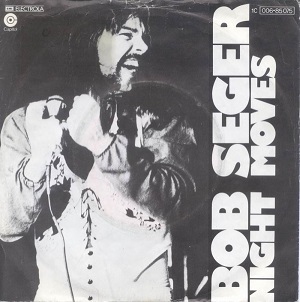
"Night Moves" is a song by American singer-songwriter Bob Seger. It was the lead single from his ninth studio album of the same name (1976), which was released on Capitol Records. Seger wrote the song as a coming of age tale about adolescent love and adult memory of it. It was based on Seger's teenage love affair, which he experienced in the early 1960s. It took him six months to write and was recorded quickly at Nimbus Nine Studios in Toronto, Ontario, with producer Jack Richardson. As much of Seger's Silver Bullet Band had returned home by this point, the song was recorded with several local session musicians.
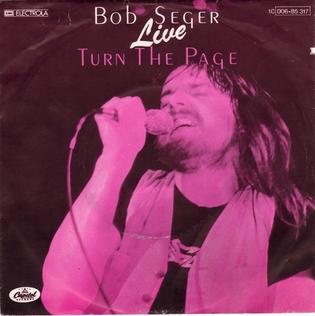
"Turn the Page" is a song originally recorded by Bob Seger in 1971 and released on his Back in '72 album in 1973. It was not released as a single until Seger's live version of the song on the 1976 Live Bullet album got released in Germany and the UK. The song became a mainstay of album-oriented rock radio stations, and still gets significant airplay on classic rock stations.
"Lucifer" is a song written by Bob Seger featured on the album Mongrel. It reached #84 on the Pop Singles chart in 1970. Many Seger fans consider this to be one of Seger's best. Ben Edmonds, in his review of Mongrel, called "Lucifer" "easily the strongest cut on the record, and a great song in its own right. It's simple, straightforward rock: the band shows a clear comprehension of the song's rhythmical movement." The Bob Seger System performed this song on the TV show Upbeat, which was a syndication of musical performances taped at the WEWS studios in Cleveland, Ohio, with host Don Webster. In 2009, a clip of the song was used in the sixth-season finale of Entourage, episode "Give a Little Bit." In 2021, "Lucifer" was covered by Deep Purple, on their album, Turning to Crime.

"Against the Wind" is a song written and recorded by the American singer-songwriter Bob Seger for his eleventh studio album of the same name. It was released as the second single from the album in April 1980 through Capitol Records. Seger recorded the ballad during a two-year process that begat his eleventh album; it was recorded with producer Bill Szymczyk at Criteria Studios in north Miami, Florida. Sonically, "Against the Wind" is a mid-tempo soft rock tune with piano backing. It was recorded with Seger's Silver Bullet Band, and features backing vocals from Eagles co-frontman Glenn Frey.

"Old Time Rock and Roll" is a song written by George Jackson and Thomas E. Jones III, with uncredited lyrics by Bob Seger. It was recorded by Seger for his tenth studio album Stranger in Town. It was also released as a single in 1979. It is a sentimentalized look back at the music of the original rock 'n' roll era and has often been referenced as Seger's favorite song. The song gained renewed popularity after being featured in the 1983 film Risky Business. It has since become a standard in popular music and was ranked number two on the Amusement & Music Operators Association's survey of the Top 40 Jukebox Singles of All Time in 1996. It was also listed as one of the Songs of the Century in 2001 and ranked No. 100 in the American Film Institute's 100 Years...100 Songs poll in 2004 of the top songs in American cinema.

"Shame on the Moon" is a song written and recorded by Rodney Crowell on his 1981 self-titled album. It was covered by Bob Seger & the Silver Bullet Band as the lead single from their 1982 album The Distance.
The discography of Bob Seger, an American rock artist, includes 18 studio albums, two live albums, five compilation albums and more than 60 singles. Bob Seger's albums have sold over 50 million copies and received seven multi-platinum, four Platinum and two Gold certifications by the RIAA.

"Rock and Roll Never Forgets" is a song written by American singer-songwriter Bob Seger. The song first appeared on Seger's ninth studio album Night Moves (1976). The song was released in early 1977 as the third and final single from the album. The song peaked at No. 41 on the Billboard Hot 100, charting less successfully than the previous two singles. Nevertheless, "Rock and Roll Never Forgets" remains popular with Seger fans, and has become a staple of classic rock radio.
"2 + 2 = ?" is a single from The Bob Seger System on their debut album Ramblin' Gamblin' Man, released in January 1968, on Capitol Records. It is an anti-Vietnam War song. The title is a reference to 2+2=5 from 1984 by George Orwell.
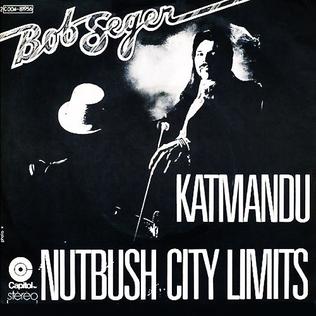
"Katmandu" is a song written and recorded by American rock artist Bob Seger. It was initially released on his 1975 studio album Beautiful Loser, which became the first of ten consecutive platinum albums for Seger. The song was later featured on his live album Live Bullet. The single edit reached number 43 on the US chart, becoming Seger's most successful single since "Ramblin' Gamblin' Man". The song was featured in the soundtracks of the 1985 film Mask, the 16th episode of Freaks and Geeks, the tenth episode of the eighth season of Supernatural, and in the 2009 documentary Journey to Everest.

"Hollywood Nights" is a song written and recorded by American rock artist Bob Seger. It was released in 1978 as the second single from his album, Stranger in Town.
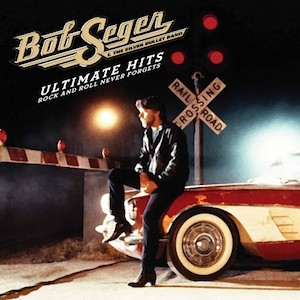
Ultimate Hits: Rock and Roll Never Forgets is a compilation album by American rock singer–songwriter Bob Seger. The double-disc album was released on November 21, 2011, and contains 26 remastered tracks from throughout Seger's career, which spans more than four decades. Included are the original mono version of "Ramblin' Gamblin' Man", Seger's first hit with The Bob Seger System from 1968, the classic Christmas song "The Little Drummer Boy" from 1987's A Very Special Christmas, which makes its first appearance on a Seger album, and previously unreleased cover versions of Tom Waits' "Downtown Train" and Little Richard's "Hey, Hey, Hey, Hey ." There is also a Walmart exclusive edition that includes the bonus track "Living Inside My Heart," a song from the soundtrack of the 1986 film About Last Night..., which has also never before been released on any Bob Seger album. Two songs on this compilation album are edited compared to the original releases: "We've Got Tonight" is the single edit, which is about one minute shorter than the album version, and "Katmandu" is a newly edited version which omits the second verse, making the song also about one minute shorter compared to the original album version. In the US it was certified gold and platinum in June 2013 by the RIAA.
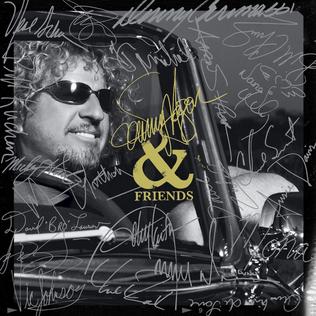
Sammy Hagar & Friends is the sixteenth studio album by American hard rock musician Sammy Hagar, released on September 24, 2013, by Frontiers Records.

"Beautiful Loser" is a song written and recorded by American rock artist Bob Seger. It was the title track on his 1975 studio album Beautiful Loser. The single just missed inclusion on the US Top 100, but became more widely known when it was included on Seger's breakout album, 'Live' Bullet (1976), where it was paired with "Travelin' Man".

















